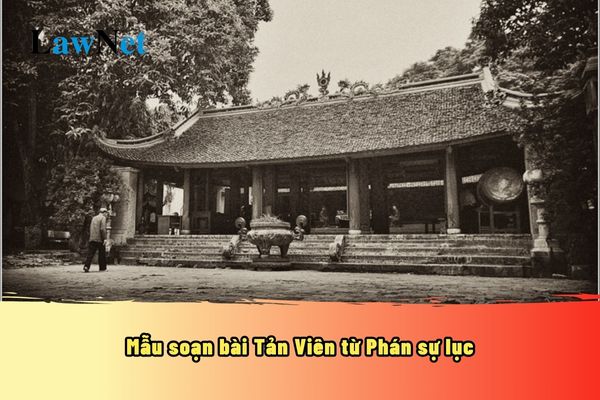What are the guidelines for preparing the lesson "Tản Viên từ Phán sự lục"? What is the relationship between the upper secondary schools in Vietnam and the students' families and society?
What are the guidelines for preparing the lesson "Tản Viên từ Phán sự lục"?
Students can immediately refer to the following sample lesson "Tản Viên từ Phán sự lục":
|
Sample lesson "Tản Viên từ Phán sự lục"
|
*Note: The information is for reference only./.

What are the guidelines for preparing the lesson "Tản Viên từ Phán sự lục"? What is the relationship between the upper secondary schools in Vietnam and the students' families and society? (Image from the Internet)
What is the relationship between the upper secondary schools in Vietnam and the students' families and society?
Under Article 45 of the Education Law 2019, the relationship between school, family, and society is regulated as follows:
- Schools actively and regularly cooperate with families and society to build a unified educational environment to achieve educational goals and principles.
- Schools cooperate with local authorities, organizations, parent-teacher associations, political-social organizations, and relevant individuals to:
+ Align educational perspectives, content, and methods between school, family, and society to achieve educational goals.
+ Mobilize community forces and resources to support education, contributing to the construction of educational facilities, and healthy, safe learning environments; prevent activities harmful to students; provide opportunities for students to play and engage in cultural, physical, and sports activities suitable for their age.
What knowledge does the 12th-grade Literature curriculum in Vietnam cover?
Under subsection 2, Section 5 of the General education program in Literature issued with Circular 32/2018/TT-BGDDT, the 12th-grade Literature curriculum in Vietnam covers the following knowledge:
*VIETNAMESE KNOWLEDGE
- Preserving and developing the Vietnamese language
- Logical errors, ambiguous sentences, and ways to correct them
- Rhetorical devices of irony, paradox: characteristics and effects
- Types of texts and genres
+ Argumentative texts: the role of arguments, reasoning, and evidence; the writer's purpose, emotions, and viewpoint; methods to increase affirmation or negation in argumentative texts;
Argumentation and expressive language; speeches at the initiation of a movement or social activity; essays on an issue related to young people; comparative and evaluative essays on two literary works of the same or different genres
+ Informative texts: the value of topics, main information of the text; types of data and their reliability; work exchange letters; reports on project task results or research outcomes on a natural or social issue
- Respect and protect intellectual property rights in learning and research
- Basic characteristics of formal and informal language: understanding and application
- Non-verbal communication tools: images, data, charts, diagrams,...
*LITERARY KNOWLEDGE
- Cognitive, educational, and aesthetic functions of literature
- Compatibility between theme, ideology, and main inspiration
- Some expressions of artistic style in folk literature, medieval literature, modern literature, realistic and romantic trends; the artistic style of the author
- Some elements of legendary tales, novels (modern and postmodern), modern lyrical poetry, comedy, memoirs
+ Legendary tales: theme, characters, language, artistic techniques; evaluating the role of fantasy elements in legendary tales, relating to their role in fairy tales
+ Novels (modern and postmodern): language, character psychology, actions
+ Modern lyrical poetry: language, imagery, symbols, symbolic and surreal elements
+ Comedy: language, characters, situations, satirical techniques
+ Reports, diaries, or memoirs: non-fictional characteristics, description, narration; combining real-life details and events with the writer's experience, attitude, and evaluation
- The psychological development of characters and methods to express character psychology by authors
- The relationship between the narrator, narrative perspective, and expressing the text's theme
- Basic understanding of Ho Chi Minh that helps comprehend some representative works of his
- Overview of literary history and the role of foundational knowledge of literary history in reading comprehension.

